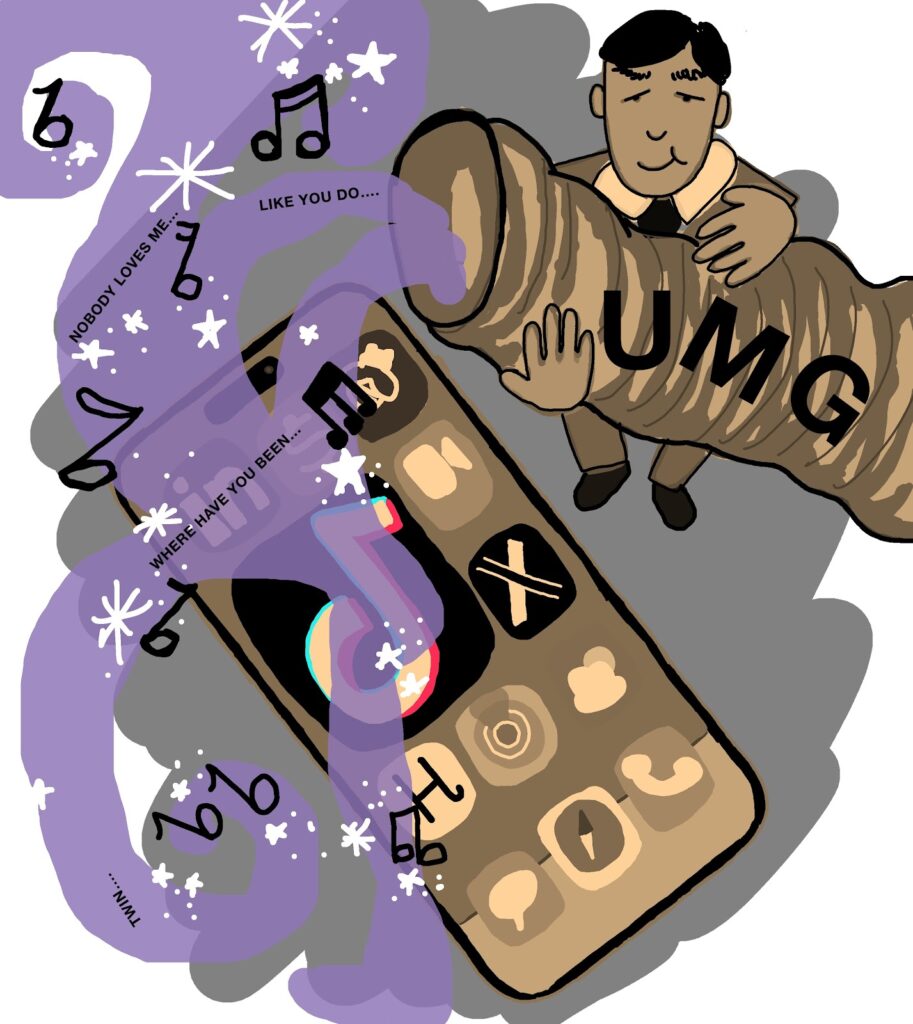
The largest record label in the world, Universal Music Group (UMG), is home to the world’s biggest artists, such as Taylor Swift, The Weeknd and Drake. The corporation failed to reach a licensing deal with TikTok, resulting in the removal of all UMG artists’ music from the platform.
In a letter to the artist and songwriter community, UMG said they stressed three critical issues throughout negotiations with TikTok: appropriate compensation for artists and songwriters, protection of artists from artificial intelligence and the online safety of TikTok’s users. TikTok failed to adequately meet their standards.
UMG emphasized the disparity between TikTok’s rising advertising revenue and the artists’ compensation, saying that the music-based app makes up around 1 percent of their total revenue.
“Ultimately TikTok is trying to build a music-based business, without paying fair value for the music,” UMG said.
TikTok’s open letter response said that UMG’s greed prevented them from reaching an agreement.
“TikTok has been able to reach ‘artist-first’ agreements with every other label and publisher,” TikTok said.
TikTok, given its substantial expansion as a platform with considerable influence over younger demographics, plays a pivotal role in the marketing and promotion of artists. Acts like Lil Nas X, Lizzo and Ice Spice have found great success with their careers because of their ability to leverage the platform’s algorithm to reach their respective fanbases.
Since its inception in 2018, TikTok reached over 1 billion monthly users, with that number expected to double by the end of 2024. Additionally, TikTok experienced over 3 billion downloads, with the app seeing a spike of 315 million downloads in the fourth quarter of 2020, the most by any app, according to Sensor Tower, an analytics and insights company. TikTok’s largest demographic is Generation Z, totaling about 62 percent of users. The app’s annual revenues increased from $63 million in 2017 to $9.4 billion in 2023.
TikTok also benefits from the products created by record labels, especially Universal Music Group, given that they control about 32 percent of the market of all artists, according to Toptal.
For example, Taylor Swift’s “Shake it Off” and Olivia Rodrigo’s “bad idea right?” have generated millions of views and have been associated with dances and other engaging trends. The songs are now gone from TikTok.
Gideon Boaten, a senior finance major from St. Louis and an independent Howard artist, spoke about the pros and cons of the dispute.
“I think it’s a poor move on UMG’s end, because TikTok is responsible for introducing songs to new audiences,” Boaten said. “It opens up a unique opportunity for an independent artist to take up more of the market share, and a space that has necessarily worked in your favor, so I think it’s good for independent artists, but for the ones signed to UMG it might not be the best thing.”
The impact of this dispute can be analyzed from various perspectives. The removal of UMG’s catalog could present an opportunity for independent artists. No longer do the top 10 percent of artists control the algorithm, trends and music discourse.
Because of TikTok’s significant role in music discovery, independent artists can establish larger fanbases, contributing to the overall virality of their careers. In a study conducted by Luminate, an entertainment data and insights company, researchers said that U.S. TikTokers are nearly twice as likely to discover music in short-form video platforms than the average user of social or short-form video platforms.
Elan Griffiths, a junior mechanical engineering major from New York City, is also an independent artist who has found success in leveraging TikTok as a promotional tool for his music. He shared that the UMG-TikTok dispute leans in favor of independent artists like himself.
“I think that in a way, this opens the door for independent artists like myself to fill the void that will be missing because of the removal of UMG’s catalog,” he said. “There will now be more room for other music that can possibly go viral on TikTok.”
Marcellus Williams, a junior marketing major from Los Angeles, is dedicated to carving his path in the music business. He has garnered invaluable experience across various facets of the music and entertainment industry, including roles in radio, live entertainment, and music technology.
Copy edited by Jalyn Lovelady































